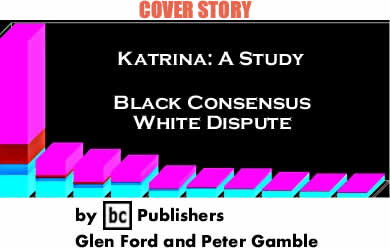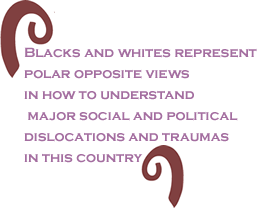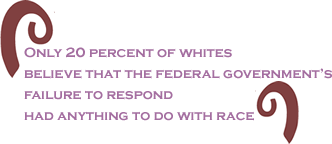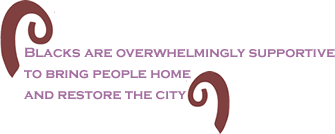Katrina: A Study. Black Consensus, White Dispute.
Categories

|
|||||||||||||||||||||
|
Hurricane Katrina may mark a watershed in Black perceptions of the African American presence and prospects in the United States. "It could very well shape this generation of young people in the same way that the assassinations of Malcolm X and Martin Luther King shaped our generation," said Prof. Michael Dawson, of the University of Chicago whose team conducted a survey of Black and white reactions to the disaster between October 28 and November 17, 2005. "It suggested to Blacks the utter lack of the liberal possibility in the United States," said Dawson, the nation's premier Black social demographer. Huge majorities of Blacks agreed that the federal government's response would have been faster if the victims of Katrina in New Orleans had been white (84 percent), and that the Katrina experience shows there is a lesson to be learned about continued racial inequality (90 percent). But only 20 percent of whites believe that the federal government's failure to respond had anything to do with race, and only 38 percent think there is something to be learned about racial inequality from the Katrina disaster.
The differences of perceptions based on an event to which the entire nation was exposed in living color, are staggeringly instructive. Blacks and whites saw the same images, but perceived them differently. The Dawson poll, which included approximately 500 whites and 700 Blacks, shows a 64 percent difference between Black and white perceptions on the federal response to Katrina, and a 52 percent divide on the disaster's significance in terms of racial equality in the United States. A Grand Canyon looms between the way African Americans and white people view the world, despite the fact that both groups are privy to the same information and images. However, there is a degree of murkiness in these figures, just as exists in the minds of human beings. Dawson's group surveyed Black and white reactions to the statements of Kanye West, the rapper, immediately after the Katrina fiasco. West said:
Curiously, a large number of whites, although a minority, agree with Kanye West, that George Bush doesn't care about Black people. In light of other indicators, one wonders what proportion of these whites is glad that the president doesn't care.
It is clear that overwhelming numbers of Blacks agree with Kanye, that Bush is hostile to Black people. The nine percent figure who think that Kanye is out of line is just about right for what we at BC call the "crazy quotient" - the nearly indivisible number of African Americans who are irrevocably lost to reality, like the majority of whites (but certainly for different pathological reasons). "Blacks and whites see two different worlds," said Prof. Dawson, whose team found that "Blacks are overwhelmingly supportive to bring people home and restore the city, while whites are overwhelmingly against federal government spending, and in favor of fiscal responsibility." Fiscal responsibility is a code phrase. It means, Don't spend money on Black folks. "Fiscal responsibility is a code word for whites for anti-Black policy," said Dawson. "Reagan used it, Bush used it, and the people who overthrew Reconstruction used it. It is one of the oldest code words in American politics. It's right up there with ‘law and order.'"
The corporate media constantly speak of Americans "coming together" in times of crisis. However, such has never happened, across racial lines - because of white intransigence. "I don't think that the Katrina disaster brought people together," said Dawson. "I think it is abundantly clear that Blacks and whites represent polar opposite views in how to understand major social and political dislocations and traumas in this country." BC Publishers Glen Ford and Peter Gamble are writing a book to be entitled, Barack Obama and the Crisis in Black Leadership.
|
|||||||||||||||||||||



